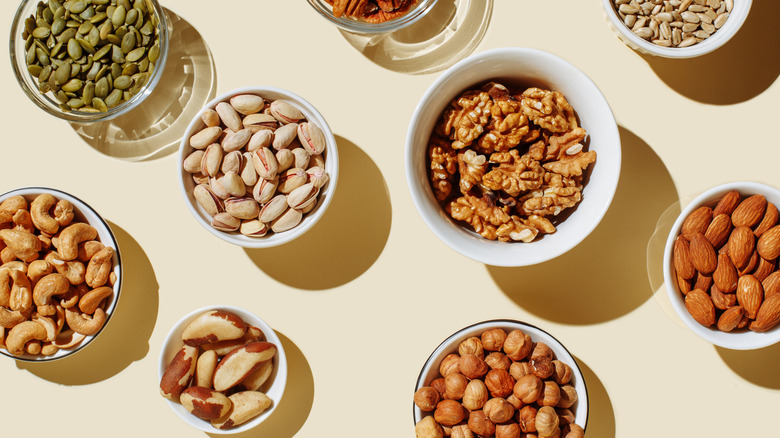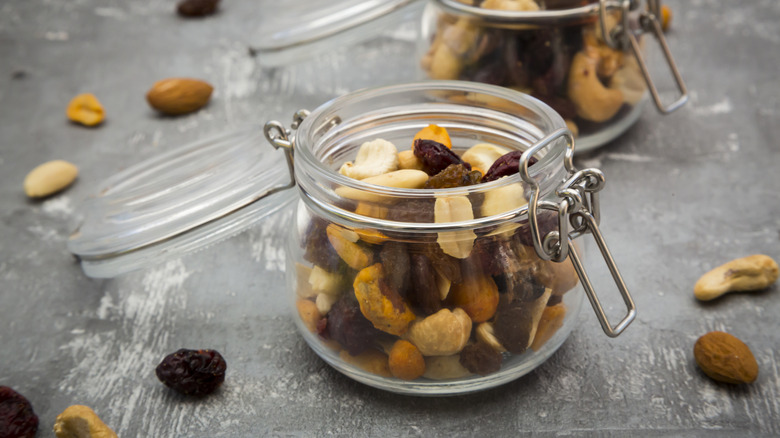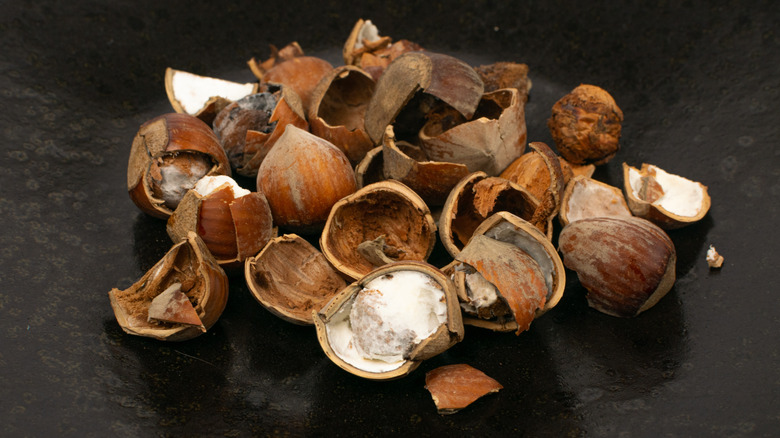Should You Store Nuts In The Fridge Or Pantry?
It's unsurprising that nuts are often treated as a low-maintenance food, especially since they're frequently packaged in pouches that just pile up in grocery store aisles. These snacks, however, which are actually classified as fruits, are one of many foods that don't last in storage like you think. It's not as easy as tossing them into your pantry or leaving them on your countertop, which is what many people do. In fact, this common mistake can actually shorten your nuts' shelf life and detract from their original quality. So, if not in your kitchen pantry, that opens up the discussion of exactly where your nuts are better kept. That would be your refrigerator or freezer.
Whether you use them in your rhubarb and cardamom oat muffins or as part of a Southern Coca-Cola and peanut mixture (yes, it's a thing), nuts have become an integral element of many dishes. Their versatility makes them perfect for countless applications, even if that means simply snacking on them straight from the bag they come in. But regardless of whether you use them in cooking or are munching on them, consistently having nuts on hand makes it all the more important to know how to extend their lifespan and preserve their quality. This starts with how you store them.
The best way to store nuts
The optimal place to stow away these crunchy goods would be the refrigerator. These cold ice boxes protect your nuts from the three factors that expedite their spoilage the most: heat, oxygen, and light. Nuts are extra sensitive to these elements due to the large amount of unsaturated fats they carry. Often referred to as "good fats," these fatty acids are highly prone to oxidation, which is what leads to the deterioration of food. The fridge defends food from this process by offering a dark, cool environment, in turn slowing down the rate at which your nuts go bad. Your nuts can last up to six months if kept in the refrigerator, versus the estimated three months they would've lasted if left at room temperature.
For the same reasons, you could also opt to store your nuts in the freezer instead. This will give them a lifespan of at least a whole year. Bear in mind, though, that because they're more exposed to the previously mentioned elements, shelled or cut-up nuts might deteriorate a little faster than in-shell whole nuts. Either way, whether you're choosing to put them in the fridge or freezer, they'll do best being transferred from their original packaging into an air-tight container.
Signs your nuts have gone bad
If your nuts aren't stored properly, or should they simply surpass their lifespan, they'll unfortunately go rancid. It won't be hard to tell when this has inevitably happened, as a quick sniff might be able to save you from doing a dreaded taste test. Bad nuts will smell sour. It can be akin to the scent of something like nail polish or paint.
But in the absence of any off-putting smells, you can perform a taste test at your own discretion. This route will immediately reveal the state of your food. Nuts are known for their crunchy texture and, well, nutty flavor. Spoiled nuts, on the other hand, will taste as sour as they smell. They'll be bitter and will have lost their firmness. Any nuts showcasing these signs of spoilage should be tossed. Even incorporating them into a recipe isn't the safest idea, as they'll alter the intended outcome of your dish.


